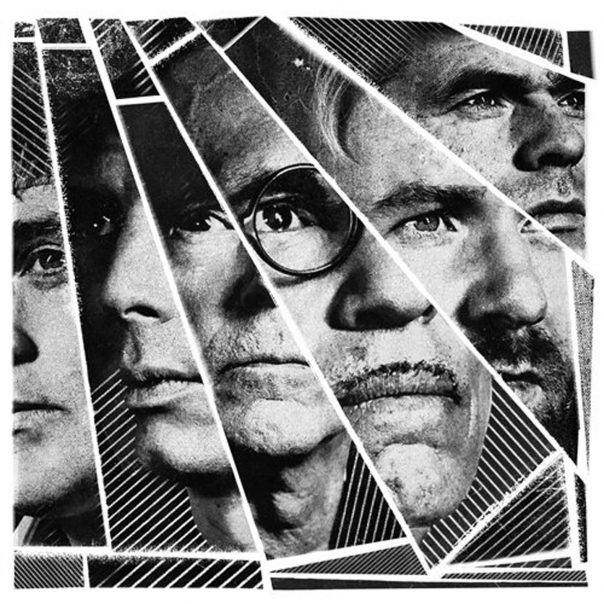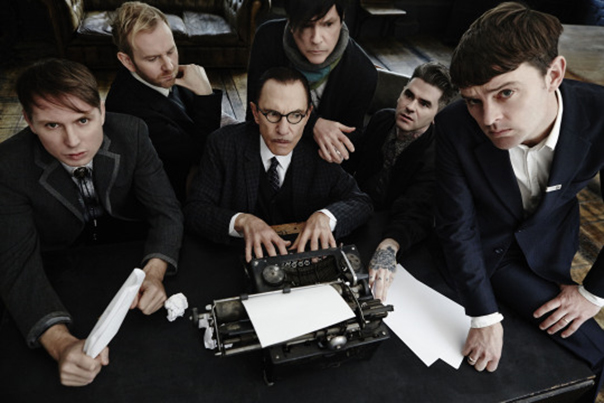FFS: A marriage, if Franz Ferdinand and Sparks knew what marriage was

FFS (Franz Ferdinand and Sparks).
I really like Franz Ferdinand. I’ve caught pretty much all of their shows in the Bay Area since 2003, and have caught a couple of shows in Oregon before, as well. But this isn’t about Franz Ferdinand; this is about FFS.
Over the past couple of weeks, I sat down with singer-guitarist Alex Kapranos and bassist Bob Hardy, and then spoke on the phone to singer Russell Mael of Sparks about the FFS story and what the two bands plan to do next. And then I wrote, and wrote and wrote. My first draft was 2,300 words, not including much of what you read below. My editor at FLOOD trimmed the story to a manageable 1,500 words. Here are parts of my recent interviews, all mashed up together, as well as some of the parts that were cut from my story but I feel fans would still be interested to read.
Franz Ferdinand’s Alex Kapranos and Bob Hardy:
“On our first (Franz) album, Paul used to double a lot of my lines. … It’s like putting a weird effect on your voice that doesn’t sound like anything else.”
The six men in FFS got along most of the time and were mature enough to know it was possible to retain their character while being part of the larger group – the issue at the heart of every band.
In the last few years they’ve become close friends, with much more in common than music, even though the Maels have been making records and touring decades longer than Franz Ferdinand.
“They’re very young in their attitude to life,” Hardy said. “It’s like hanging out with guys in their 20s. It’s like they haven’t aged since they first had success. It’s funny.”
In the U.S., Franz Ferdinand’s fans wholeheartedly embraced Sparks, Kapranos said. The ages of the two bands’ fans were often decades apart, but from what he could see from the stage, he said they found plenty in common. In the back of his mind, he knew that wasn’t always the case, and that the partnership of Metallica and Lou Reed didn’t lead to love between their fans.
Kapranos, Hardy, (Drummer Paul) Thomson and (Guitarist Nick) McCarthy didn’t watch only their fans throughout the FFS project. They also studied (Sparks’ keyboardist) Ronald and (singer) Russell Mael, and came away with several key findings. Foremost, they believe Sparks’ intellectually leaning song writing has led to their longevity as a band.
While that is already part of Franz Ferdinand’s makeup, the band picked up more pointers along the way. Musically, the Franz members noticed how the Maels’ subtle alterations to chord progressions and inversions create a sound unlike others. Kapranos compared learning those subtle alterations to picking up on a friend’s sense of humor.
“You absorb that stuff, and it becomes part of your own personality eventually,” Kapranos said.
“Twenty-odd records into their career and they’re still looking forward; never quite resting,” Hardy added. “They’ve evolved (and) every decade has been kind of a different sound for them.”

FFS (Franz Ferdinand and Sparks).
I read that when Franz first got together, one of the first songs you tried to cover was “Achoo”, and that eventually that cover led to either “Tell You Tonight” or “The Dark of the Matinee.”
Kapranos: No, that’s not true.
Hardy: The tune was just really hard. I only just picked up the bass, really.
Kapranos: You’d been playing the bass for like two weeks at that point.
Hardy: Yeah, and there was all sorts of things (like) hammering on, which was just beyond my comprehension, so it was impossible.
Kapranos: What ended up happening was we ended up playing “This Fire” instead, which is much more on the beat.
Hardy (Simulating his bass line from “This Fire”): Dum, dum, dum, dum, dum, dum, dum.
Kapranos: (Laughs). It’s got two notes in the whole song. Well, that’s not true actually, it’s got about five.
As a six-piece, do you guys have nicknames for each other?
Kapranos: We haven’t actually thought of nicknames for anybody else. What would it be? Russell’s like the cowboy at the moment with his poncho on. Ladies Man Nick, ladies love Nick. Paul; Blondie.
When deciding who sung which line, did it ever come down to, “No, this is my line, don’t touch it?”
Kapranos: Oh, no, no, no, quite the opposite. When we sang the songs, when it came to the vocals, we quite deliberately decided to split the lines up between the two vocalists so it didn’t feel like there was any lead singer. I know we don’t sound like them but we actually took a lead from ABBA, because the aesthetics of ABBA aside, we wanted to have a band where there were two distinct lead singers. There are parts of the album where you can definitely tell it’s Russell singing, parts where you can definitely tell it’s me. But for me some of the favorite bits are when the voices actually come together and you get this third voice, this voice which is a combination of the two singing in unison together.
What’s the relationship between all of you? Is it friend or mentor…?
Kapranos: I’d say nearer to friend than mentor.
Hardy: I’d call them friends.
Kapranos: We have had fun hanging out, outside the environment of a studio and outside the environment of a live gig.
You get along just fine, even when you’re doing other than talk about music.
Kapranos: I think they have a very youthful attitude but not an immature attitude, I need to make that distinction. They’re very wise and worldly.
Hardy: If you’ve made 20 albums you’ve kind of seen every aspect of the music industry.
Kapranos: They still manage to retain the energy and the enthusiasm. I’ve got to say this, you have to have a certain positive naivety to embark on any musical project, really.
Hardy: Or any creative project.
Kapranos: I think that’s part of the key, and to maintain that after 24 albums or whatever, it’s quite astonishing really. Having a fresh mind. I remember when we were mixing the album in Dallas, we went out 10-pin bowling with them and that was great. That was fun. I was going to say I’ve not been 10-pin bowling with anyone else that age, but I did go with my parents three weeks ago, so that’s not quite true. (laughs).
What’s it like sacrificing a part of yourself for the greater good?
Sparks singer Russell Mael: Both bands have our own ways of working … and in your own kind of language that you use for being able to communicate ideas and some things are even unspoken because you’ve been working with someone for so long, as I have with Ron. When you’re working with somebody that you haven’t before, you have to learn the new vocabulary and the new language of how the other band communicates and all, so those things went relatively painlessly, that whole process, because we all got along well and, in the end, we ended up speaking the same language in more cases than not.
What was the biggest lesson you learned in the process?
Mael: We don’t really approach things in those sort of terms, as far as learning process. We’ve been doing it a long time, I don’t know if there’s anything specific as to learning from it. You learn that working with another band, (is) like a marriage where there’s good days and bad days. I’ve never been married, so that analogy is not good either. But I assume from people I know who are married that it would be like that.
What’s next for Franz Ferdinand?
Kapranos: It’s very rare (for) any kind of artist, whether a musician or any other form of artist, that you think about one thing purely all the time. You have your mind on other things, too. Of course, when we were back in Scotland hanging out we were writing other songs, as well. They felt more like Franz songs, really. We’re going to get back together in a couple weeks when we’re all back in Scotland and I imagine we’ll write songs. That’s what we do.
Who wanted this collaboration more?
Hardy: I think we all enjoyed it equally.
Kapranos: I don’t think anybody particularly was chasing it.
Hardy: It wasn’t like that. They’ve always got something on the go. It’s not like if we hadn’t done this they’d have been sitting at home twiddling their thumbs. They’ve got like 3 other projects going on behind the scenes simultaneously as well.
Mael: I don’t know who wanted to do it more or less. Obviously, it’s a commitment for both bands when it’s two really established groups who have their own body of work. You’re going to set aside your individual band projects to merge into one and to do something that’s as time-consuming as this. We spent the last year-and-a-half with them. Most days we were together doing something. … So the commitment is pretty high for both bands, so to delineate one band was more into it, I would have to say that, from my perspective, both bands have to be into it pretty deeply in order to do something like this. There’s not many precedents. Rap people working together, or somebody guesting on somebody else’s one song. But to fully immerse yourself in something to this extent takes a commitment on both sides, so I would say both ends have to be, and were, equally committed.
Follow editor Roman Gokhman at Twitter.com/RomiTheWriter.
